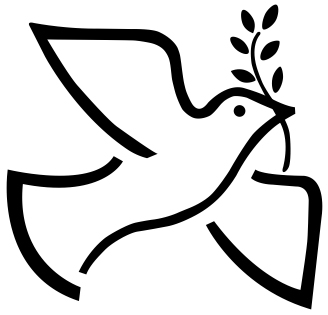TOWARDS GLOBAL PEACE
 We often talk of peace in the context of war. But this is a very narrow and restricted notion of peace. Peace is deeply linked with the entirety of human life. Peace is a complete ideology in itself. Peace is the only religion for both—man and the universe. It is the master-key that opens the doors to every success. Peace creates a favourable atmosphere for success in every endeavour. Without peace, no positive action—small or big—is possible.
We often talk of peace in the context of war. But this is a very narrow and restricted notion of peace. Peace is deeply linked with the entirety of human life. Peace is a complete ideology in itself. Peace is the only religion for both—man and the universe. It is the master-key that opens the doors to every success. Peace creates a favourable atmosphere for success in every endeavour. Without peace, no positive action—small or big—is possible.
TOWARDS A NONVIOLENT WORLD
A Lesson from History
THOUGH the history of nonviolent movement is a very long one, historians concede that “the most massive and historically effective example of nonviolent activism was that of the movement organized by Mahatma Gandhi”.
India can be justly proud that it was in this country, under the leadership of Mahatma Gandhi, where for the first time in human history a nonviolent movement culminated in such resounding success.
The first target for Mahatma Gandhi was to usher in peaceful political change throughout the country. This ambition was fulfilled in 1947. Mahatma Gandhi’s second target was to bring about social change on the basis of nonviolence. But before he could achieve his second target, he was tragically removed from the scene of action.
Now our greatest need is to fulfil Mahatma Gandhi’s mission. After political change we have to bring about social change in our country through Gandhi Andolan, that is, a nonviolent movement. If India could be successful on this front, it would undoubtedly find itself in a position to give the lead to the entire world.
There is only one way of exploiting the nonviolent method for the reform of a society—and that is, to bring about a change in the thinking of the individual, the basic unit of society.
It has been rightly observed that all violence is born in the mind, and that it can be terminated in the mind itself. For instance, during the Second World War, Japan was burning to revenge itself on America. Japanese said that America had devastated their town of Hiroshima, so they would devastate America. Although Japan’s air force had been badly hit, its army was still intact, and its officers were bent on vengeance. At that juncture certain intellectuals in Japan pointed out that if America had destroyed Hiroshima, they had already destroyed America’s Pearl Harbour. In this way they were at par. The score was even.
Due to this timely guidance, the Japanese came to rethink their position, and, abandoning the path of confrontation with America, opted instead for the path of adjustment with it. In so doing, they were tremendously successful.
The truth is that intellectual awakening is the only way to produce a nonviolent world. This is, without doubt, a long and laborious struggle. But we have no other alternative. Violence is the result of misguided thinking. The day you succeed in putting an end to such thought, violence will disappear on its own.
Take the case, for example, of riots in India. In this matter it has been found that riots are a result of erroneous way of thinking. If one has the patience to find out the truth, one will get the correct understanding of the situation. For example, a group of people, at some disturbing news of loss caused to them by another group, immediately react and try to settle scores with the other group leading to violent behaviour. Instead if they were to first analyze the truth about the situation, then decide on the most result-oriented course of action, there would be more chances of finding solutions. With such controlled behaviour, the first benefit would be prevention of further loss. Immediate reactionary violence will cause harm to both the parties involved, and the worse aspect is that it does not solve the problem or compensate the loss. On the contrary it will escalate the matter further.
An individual is always governed by his thinking. That is why, if we have to make a nonviolent world for a peaceful society, there is only one way, and that is by using educative methods to convert people’s thinking from violence to nonviolence, and to enable them to seek solution to matters of controversy through peaceful means. We must learn to understand the value of tolerance and avoidance as opposed to intolerance and confrontation. It is from such intellectual awareness alone that a nonviolent world and a peaceful society can be constructed.





